Navigating the complexities of autism can feel like a daunting journey for families, especially when it comes to the challenge of elopement. Did you know that nearly 50% of individuals with autism engage in wandering behaviors? That’s a staggering statistic! It really highlights how crucial it is to have effective community resources at our fingertips.
In this article, we’ll explore ten invaluable resources designed to empower families like yours. These strategies and support systems not only enhance safety but also foster a sense of community and understanding. How can these resources transform the way families approach elopement? What proactive steps can we take to ensure the well-being of our loved ones? Let’s dive in and discover together!
At Rori Care, we understand the unique challenges that families face when it comes to supporting youth with autism. Our extensive ABA therapy is designed just for them, combining data-driven evaluations with personalized treatment plans. This means every child gets the tailored support they need to thrive!
We know that behavior modification can be a game-changer. By focusing on this, we empower families and clinicians to adopt effective strategies utilizing community resources for families of children with autism who elope that can really help reduce elopement incidents. Imagine feeling more secure knowing you have the right tools at your fingertips!
Plus, we’re all about using advanced technology to enhance the therapeutic experience. With real-time data, we can monitor progress and adjust interventions as needed. This innovative approach not only creates a safer environment for young individuals but also encourages their overall development and independence.
Let’s explore this together! We’re here to help you every step of the way!
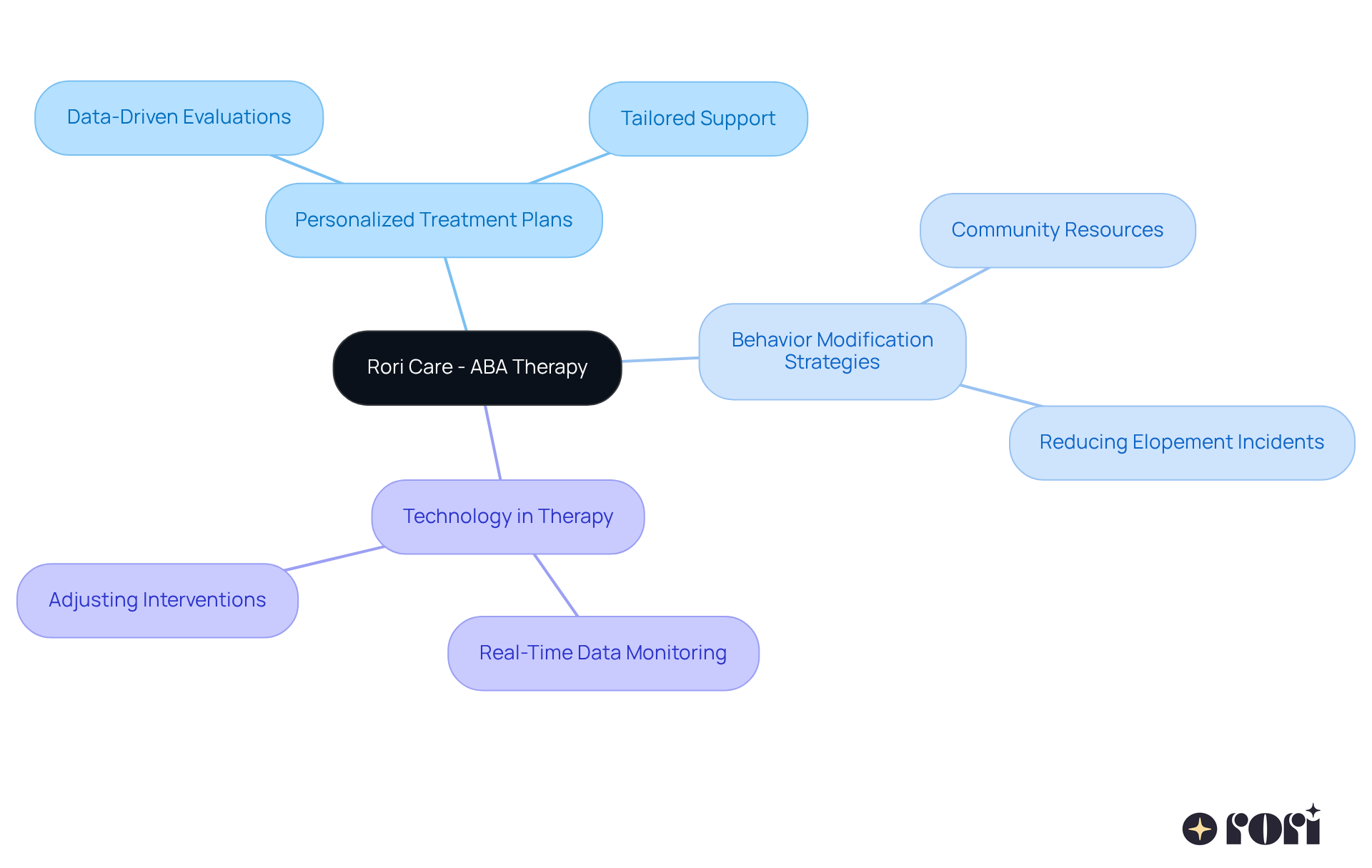
The National Autism Association (NAA) has a fantastic range of community resources for families of children with autism who elope, aimed at helping them tackle the issue of wandering in youth with autism. One standout offering is the 'Big Red Safety Box,' packed with essential emergency tools like alarms, ID kits, and response plans. Since it launched in 2011, this initiative has delivered over 75,000 boxes, making a real difference in keeping children safe from wandering.
Families who have accessed community resources for families of children with autism who elope often share positive experiences in managing elopement risks. The NAA's protective toolkits not only equip families with practical tools but also come with educational brochures that raise awareness about the dangers associated with wandering. Sadly, in 2024, over 80 youths with autism lost their lives due to wandering, mainly from accidental drowning. This highlights just how crucial these preventive measures are.
Experts agree that these safety toolkits are effective. They advocate for a multi-layered approach to prevent absconding, emphasizing the importance of quick actions, like contacting emergency services and checking nearby water sources if a child goes missing. By utilizing community resources for families of children with autism who elope, provided by the NAA, families can take proactive steps to protect their loved ones, ultimately creating a safer environment for those at risk of wandering.
Let’s explore this together! By reaching out and utilizing community resources for families of children with autism who elope, you’re not only taking a step for your child’s safety but also joining a community that understands and supports you.
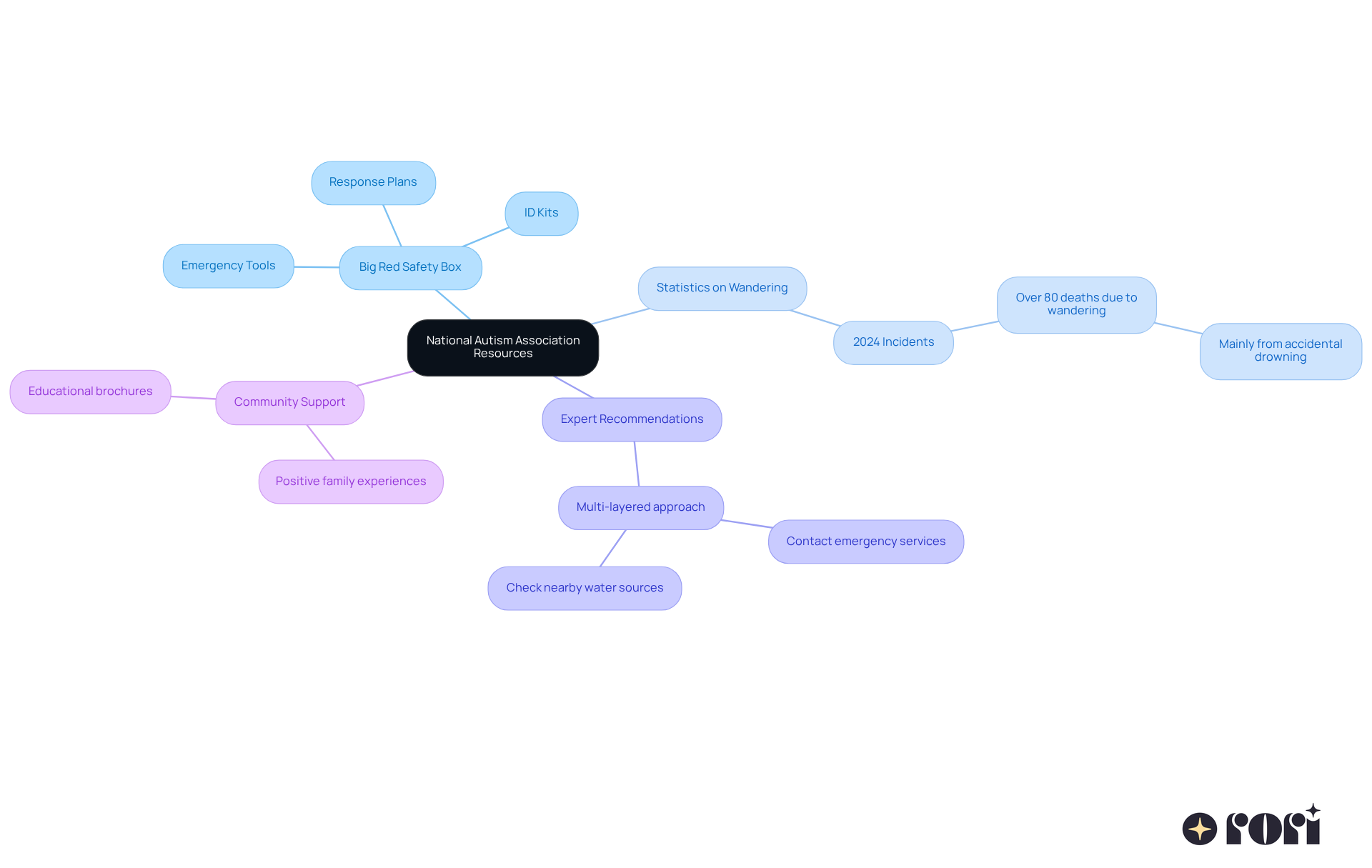
The Centers for Disease Control and Prevention (CDC) shares important guidelines aimed at helping families protect youth with disabilities, especially those who might wander off, and emphasizes the need for community resources for families of children with autism who elope. One key tip? Secure your home! Simple locks on doors and windows can make a big difference in keeping your little ones safe from wandering outside unsupervised. It’s also a great idea to teach your kids essential safety skills, like recognizing STOP signs and understanding why it’s important to stay close to caregivers. And don’t forget about having a solid emergency plan in place! This plan should outline what to do if a child strays away.
Now, let’s talk about caregiver education. It’s super important! By giving caregivers a better understanding of ABA principles and strategies, they can make informed choices that really help their child thrive. This knowledge allows caregivers to consistently reinforce safety measures at home, working hand-in-hand with professional interventions.
Community awareness plays a huge role in preventing wandering incidents, too. Getting neighbors and local community members involved can create a supportive network that boosts security. For instance, families can share information about their child’s wandering habits, including a picture and contact details, to ensure quick communication in emergencies. Plus, the CDC emphasizes the importance of documenting wandering incidents. This can help caregivers spot patterns and triggers, leading to more effective prevention strategies.
Experts in youth safety recommend that families regularly assess their home for potential risks and implement protective measures, like alarm systems that alert guardians when doors are opened. By following these guidelines and utilizing community resources for families of children with autism who elope, families can significantly reduce the risks associated with wandering and create a safer environment for their kids. Did you know that nearly 50% of individuals with autism engage in elopement behavior? And tragically, 91% of fatalities in those with autism under 14 occur due to drowning after elopement. Individuals with autism are also 160 times more likely to drown compared to their neurotypical peers. By following these recommendations and empowering caregivers through education, families can take proactive steps to keep their children safe. Let’s explore this together!
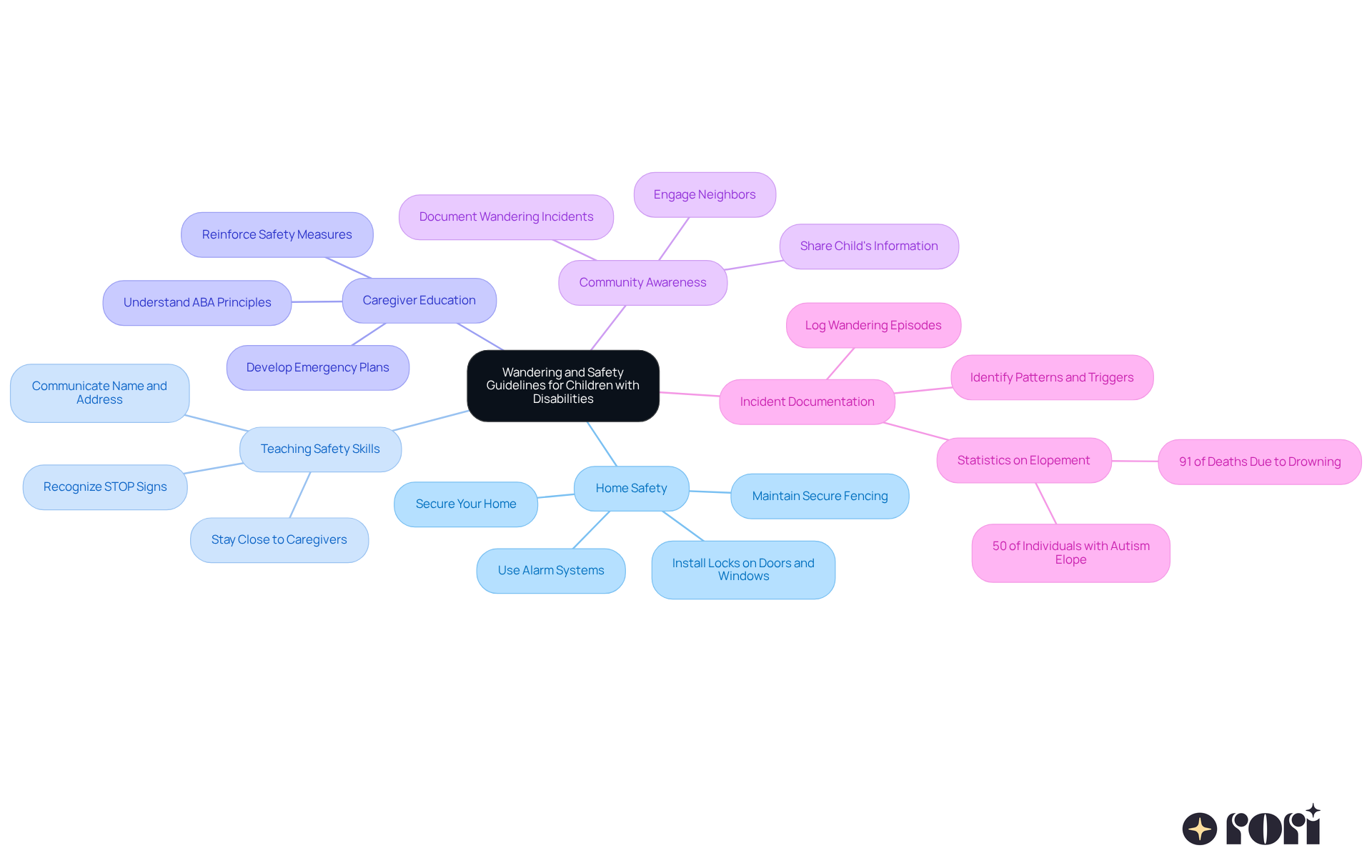
At the Marcus Autism Center, we recognize that wandering can be a significant concern for families, which is why we provide community resources for families of children with autism who elope. That’s why we offer specialized strategies that focus on understanding the triggers and behaviors related to wandering. Imagine creating structured routines and using visual supports that help your loved ones feel more secure. Plus, engaging in community awareness programs can make a big difference!
We encourage families to collaborate with local law enforcement and community members to improve community resources for families of children with autism who elope. It’s all about working together! Developing emergency plans and utilizing community resources for families of children with autism who elope, along with making some simple environmental modifications like installing locks on doors and windows, are crucial steps to minimize the risk of elopement. By implementing these strategies, you can create a supportive environment that significantly boosts the safety and well-being of individuals with autism.
And let’s not forget about adaptive treatment plans! Incorporating progress reports and active caregiver participation, as highlighted in Applied Behavior Analysis Therapy, can really strengthen these efforts. It ensures that each individual’s unique needs are addressed effectively. Let’s explore this together and make a positive impact on your family’s journey!
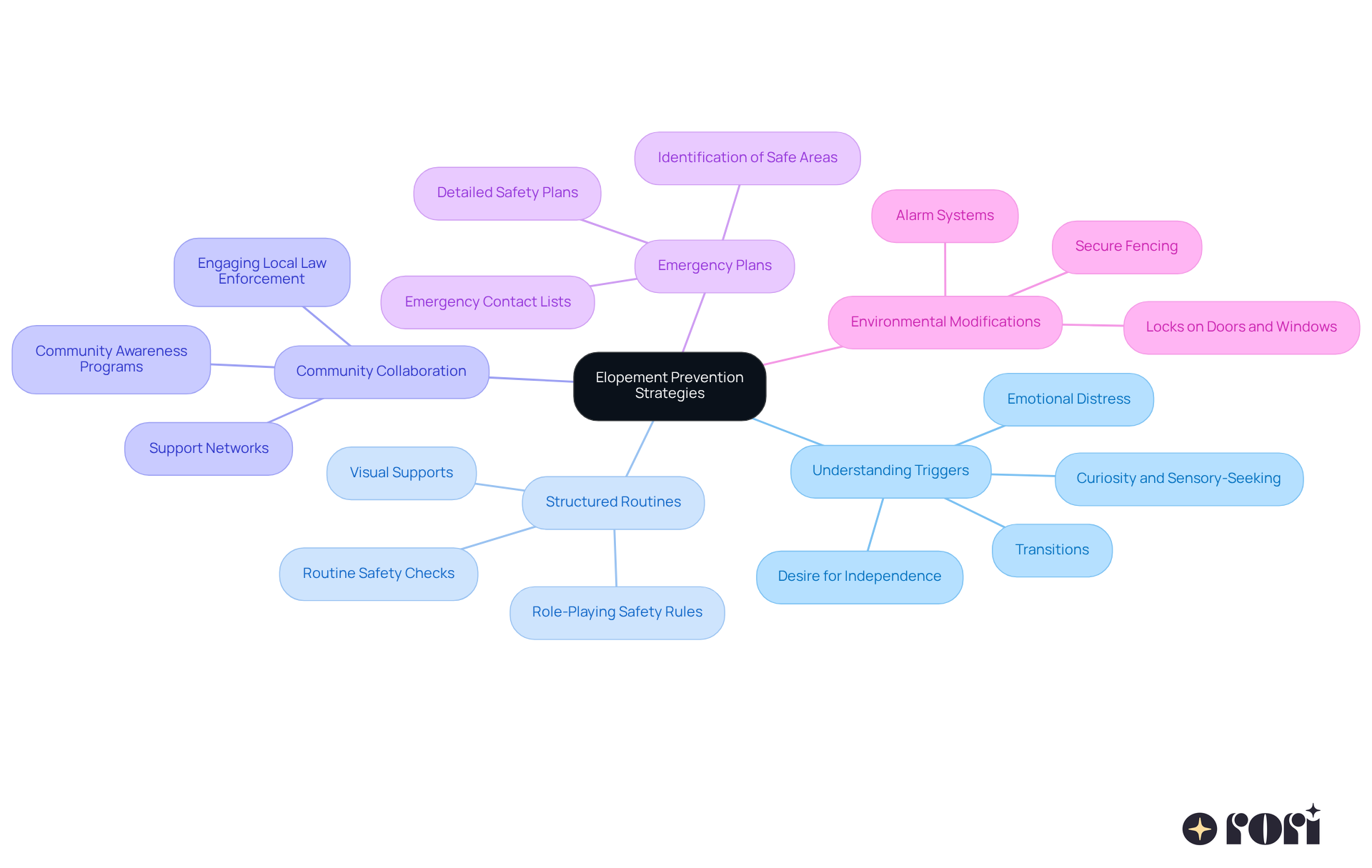
TACA provides a wealth of community resources for families of children with autism who elope, aimed at keeping individuals with autism safe from elopement. Their security guides are packed with essential tips for creating a secure home environment. This includes simple steps like:
Teaching young ones important safety skills, such as knowing their name and phone number, is crucial too.
TACA really emphasizes taking proactive steps. They recommend that families of children with autism who elope utilize community resources to:
This plan should outline specific actions to take if a child goes missing, ensuring that everyone in the family is prepared. Plus, TACA encourages families to utilize community resources, which can significantly reduce the chances of runaway incidents.
By tapping into TACA's resources, families can boost their preparedness and response strategies, creating a safer environment for their children. Let’s explore this together and make sure our loved ones are protected!
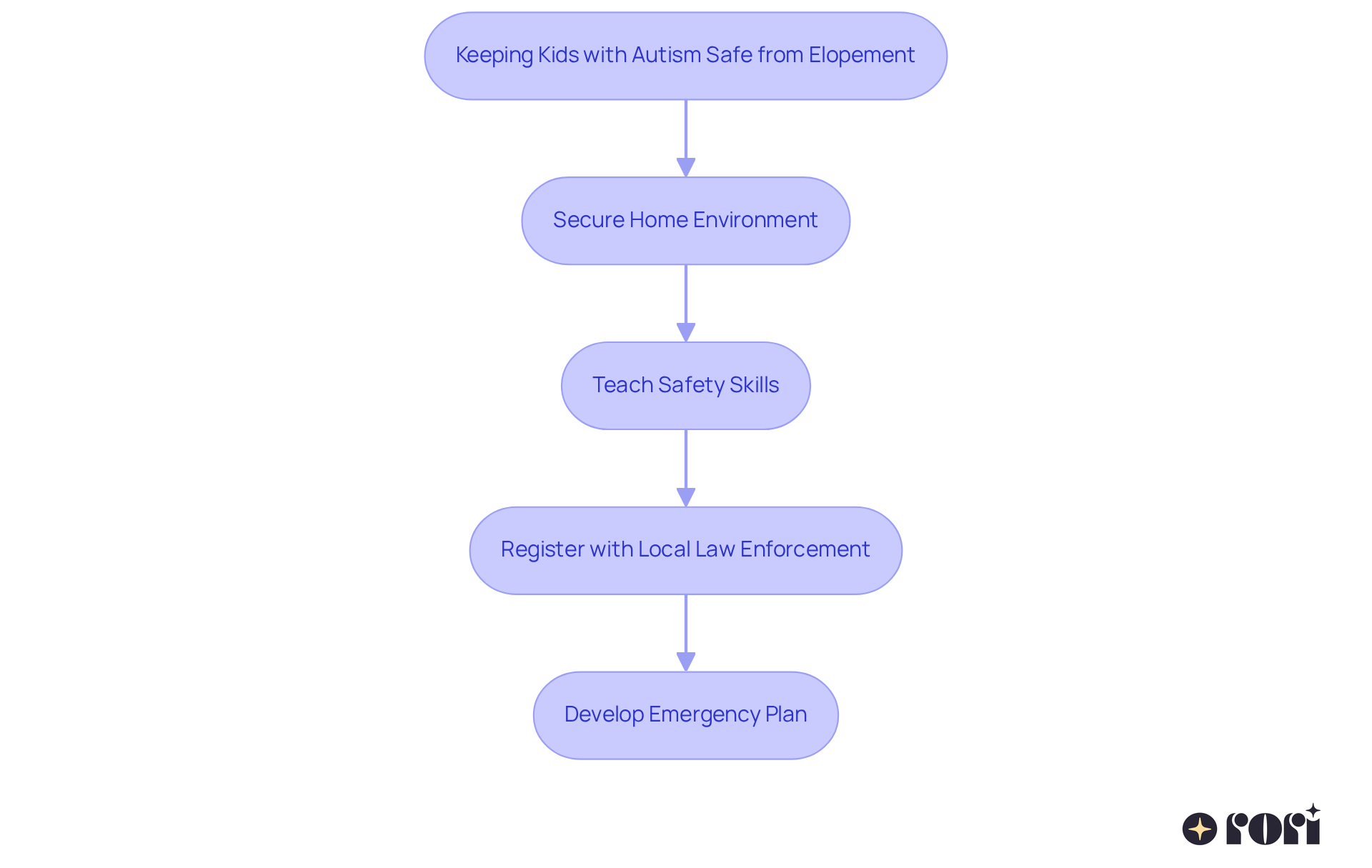
The Autism Toolkit provides community resources for families of children with autism who elope, helping caregivers understand elopement behaviors in individuals with autism. It sheds light on common triggers for wandering, like sensory overwhelm and curiosity, while offering practical protective measures. For instance, using high-visibility clothing can really help keep young individuals safe by making them easier to spot.
It's also important to develop clear communication strategies. Families should create a protection plan that identifies safe areas and teaches kids how to respond in potentially dangerous situations by utilizing community resources for families of children with autism who elope. Some households have even set up alert systems and engaged their communities by utilizing community resources for families of children with autism who elope to enhance safety.
By utilizing the Autism Toolkit, families can create a safer environment, empowering their kids to explore the world with more confidence. Let’s explore this together! We’re here to help you every step of the way!
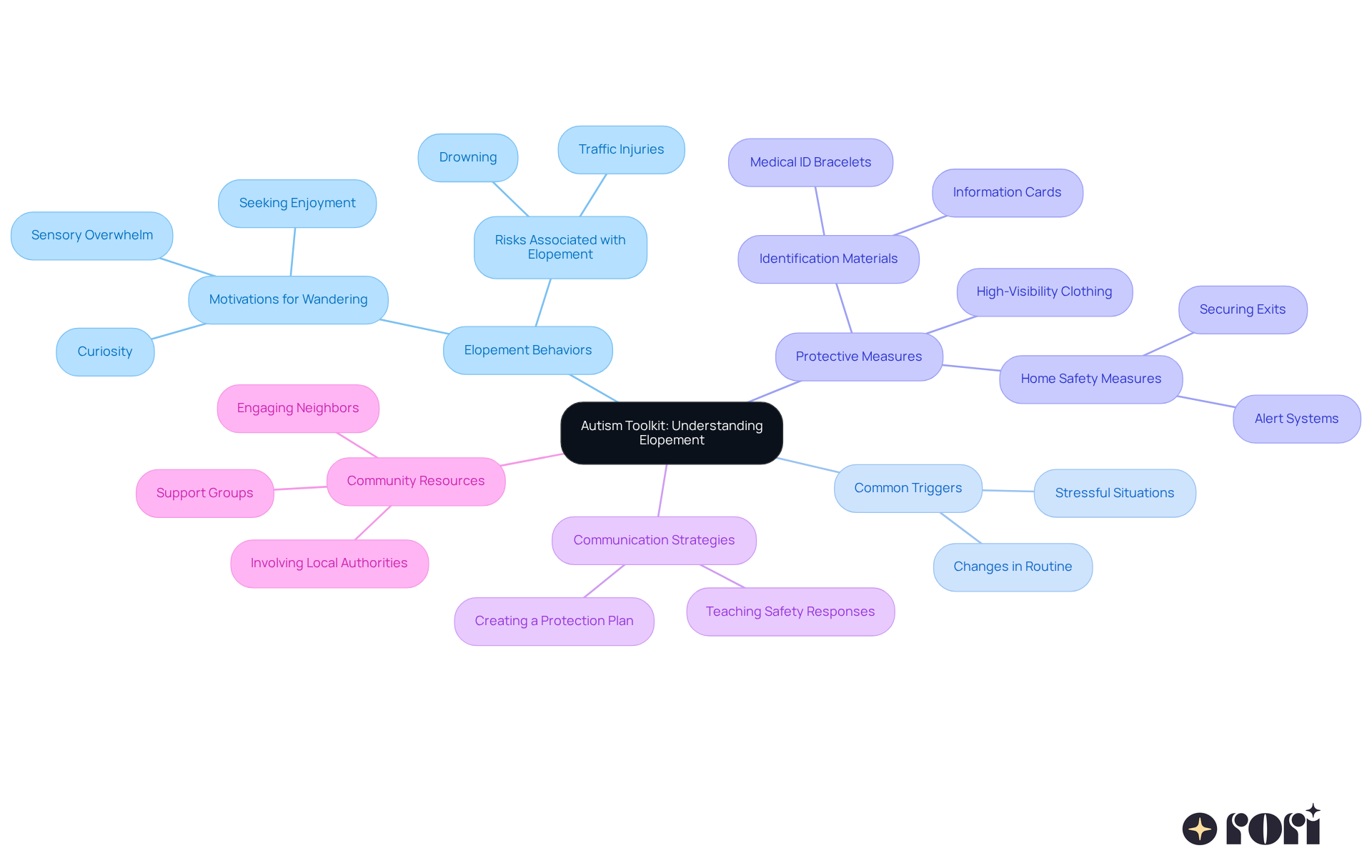
At Advocate Children's Hospital, we understand the unique challenges that families face when caring for children with autism who elope and the importance of community resources for families of children with autism who elope. That's why we offer a variety of health resources aimed at improving well-being for these little ones. From risk evaluations to health education and community outreach programs, we’re here to support you every step of the way!
Families can find valuable information on managing health conditions that might lead to elopement behaviors by utilizing community resources for families of children with autism who elope. Plus, we provide strategies for creating a safe home environment. By partnering with healthcare professionals, you can ensure that your child receives the thorough assistance they need for their security and wellness.
And let’s not forget about Rori Care - ABA Therapy! This program empowers children with essential skills to navigate the world independently, highlighting the effectiveness of Applied Behavior Analysis (ABA) therapy. With active caregiver participation, an impressive 90% of kids show significant progress. This not only helps them but also supports families in their efforts to prevent wandering and enhance safety through community resources for families of children with autism who elope.
Let’s explore this together! We’re here to help you every step of the way!
The Autism Project provides community resources for families of children with autism who elope to help families, caregivers, and educators tackle the challenges of wandering behaviors. We know how concerning it can be when kids wander off, and that’s why our comprehensive training and educational materials include community resources for families of children with autism who elope.
Our programs provide essential knowledge and skills to help you identify and address wandering effectively. We dive into important topics like:
Specialists emphasize that understanding why children run away is key to intervening successfully.
By participating in these educational opportunities, families can boost their ability to prevent wandering and enhance their children's safety through community resources for families of children with autism who elope. Plus, we focus on adaptive treatment plans that are regularly updated based on progress reports and caregiver feedback, which can lead to better outcomes.
We encourage you to explore local training opportunities and consider creating an Individual Crisis Management Plan (ICMP) using community resources for families of children with autism who elope. This way, you can develop tailored strategies that meet your child's unique needs. Let’s explore this together! We’re here to help you every step of the way!
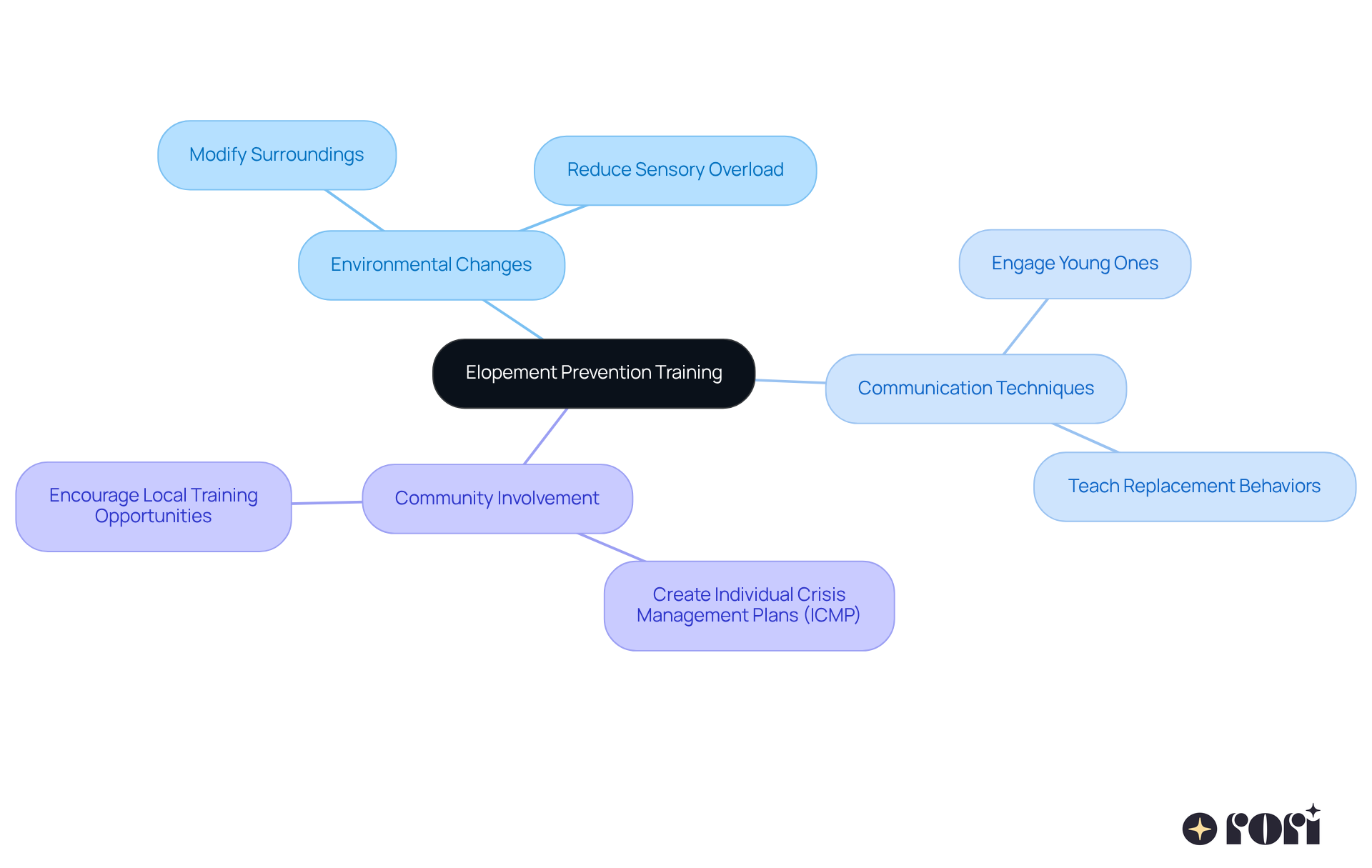
At Rori Care, we truly understand the challenges parents face in finding community resources for families of children with autism who elope. That’s why we excel in providing personalized ABA therapy tailored specifically for youth. Our innovative, data-driven approach empowers clinicians to create individualized treatment plans that effectively tackle behaviors like elopement, including the utilization of community resources for families of children with autism who elope to ensure your child gets the care they need.
Imagine a therapy session where advanced technology, including AI-driven progress report automation, allows clinicians to focus more on your child. With Rori Care, we’re able to free up 50% more time for direct treatment! This dedication to individualized care, along with community resources for families of children with autism who elope, not only helps enhance skills but also actively reduces the chances of wandering, creating a safer environment for your little ones and peace of mind for you.
Research shows that children receiving intensive ABA therapy often experience remarkable improvements, boasting a success rate of over 89%! Plus, we believe in empowering caregivers with ABA principles and strategies. This means you’ll have the tools to support your child better, make informed decisions, and ultimately see improved behavioral outcomes. We’re here to help you every step of the way!
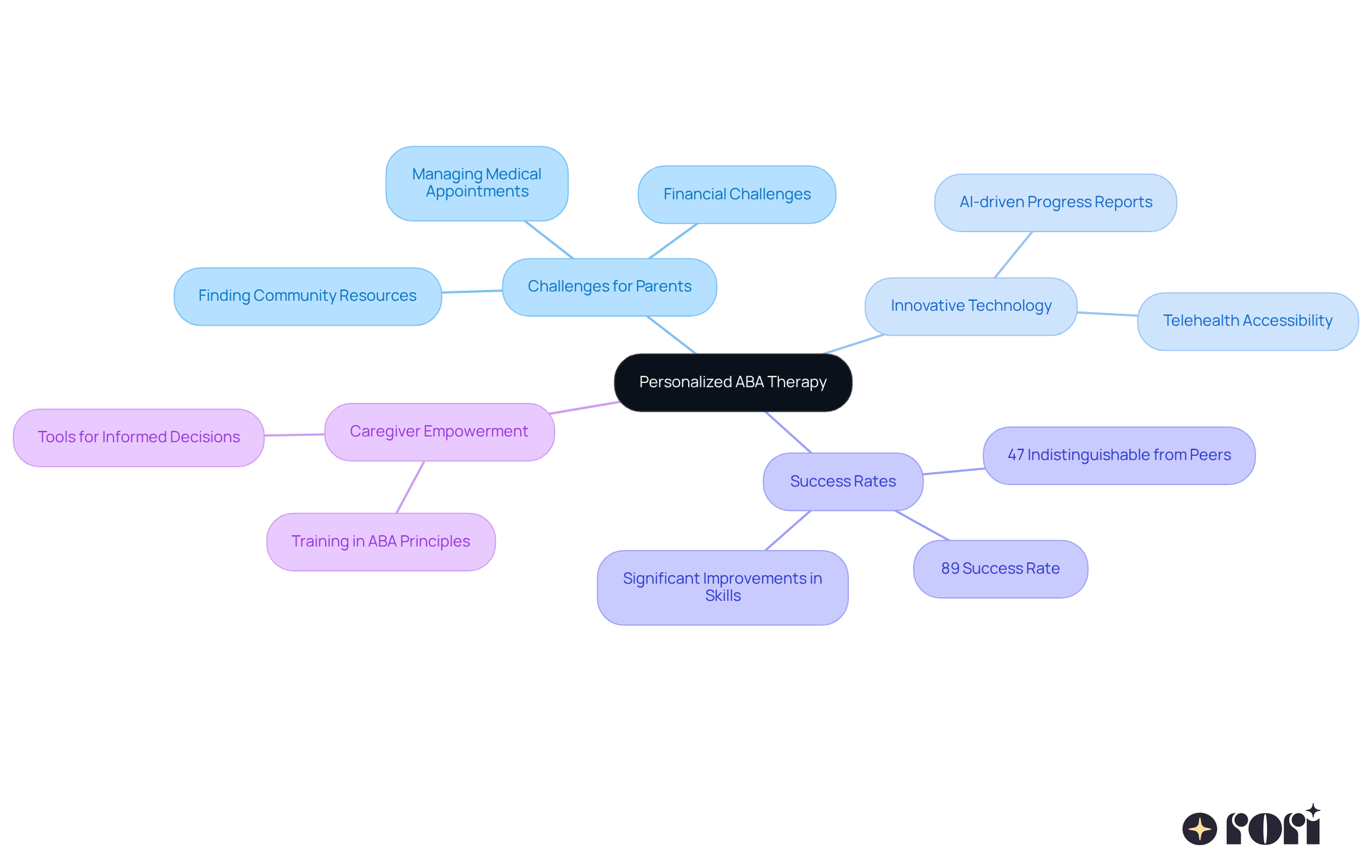
Families facing the challenge of running away often find themselves in need of support, and thankfully, there are plenty of resources out there to help. Local autism support groups are a fantastic starting point. They provide a welcoming space for parents to share their experiences and strategies. Plus, these groups frequently organize community workshops focused on protective strategies, which serve as community resources for families of children with autism who elope to help prevent wandering.
But that’s not all! Online forums have become a lifeline for many parents, offering a sense of community and shared understanding. It’s heartening to see how popular these platforms have become, with many parents finding comfort and advice from others who are navigating similar challenges. By connecting with these networks, families can significantly enhance their ability to manage elopement by utilizing community resources for families of children with autism who elope to keep their children safe.
And let’s not forget about Rori Care! They offer caregiver education programs that empower caregivers with the knowledge and skills needed to make informed decisions that positively impact their child's progress. This kind of involvement can lead to improved behavioral outcomes, as it aligns with therapeutic strategies.
As Temple Grandin wisely said, 'I am different, not less.' This quote beautifully reminds us of the unique perspectives that come from our experiences. So, parents, don’t hesitate to seek out local support groups and online forums to connect with others who understand what you’re going through. And consider Rori Care's caregiver education programs to further strengthen your support system. Let’s explore this together!
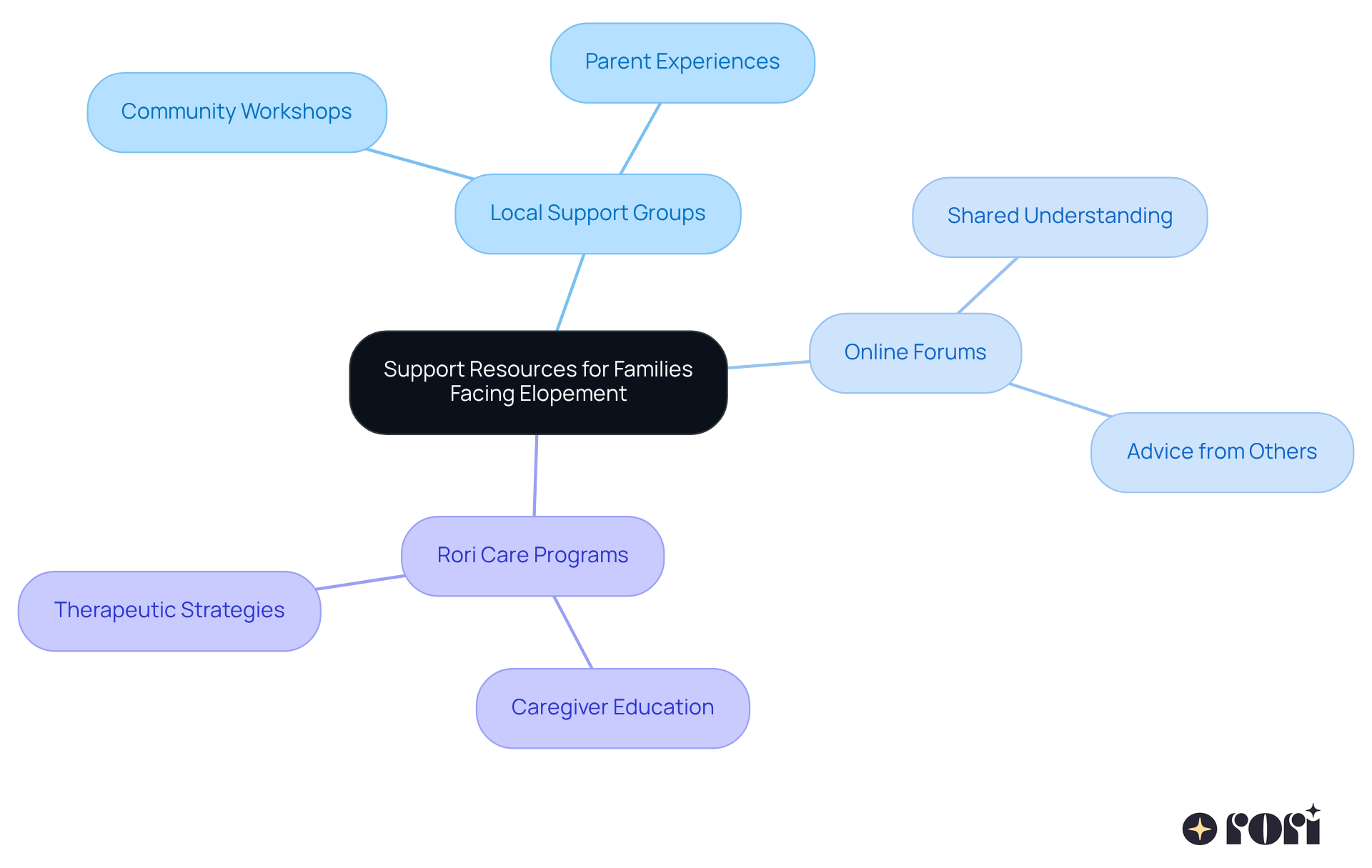
Engaging with community resources for families of children who elope is so important for ensuring the safety and well-being of individuals with autism. Each resource we discuss highlights how tailored support, proactive strategies, and community involvement can really help tackle the challenges that come with elopement. By creating a collaborative environment, families can boost their ability to protect their loved ones while navigating their unique journeys.
Let’s take a look at some key insights! There’s a diverse range of resources available, from ABA therapy and safety toolkits to educational programs and community support groups. Organizations like Rori Care, the National Autism Association, and TACA offer essential tools and strategies for families, empowering them to create safer environments and effectively manage elopement behaviors. Plus, guidelines from the CDC and initiatives from local autism support groups remind us how crucial it is to have comprehensive safety plans and community awareness.
Ultimately, when families, professionals, and community organizations come together, we can make meaningful changes in the lives of those affected by autism. Engaging with these resources not only strengthens individual families but also builds a supportive network that fosters understanding and collaboration. Embracing these strategies can truly make a difference in preventing elopement and ensuring that children with autism can explore their world safely.
So, let’s explore this together! We’re here to help you every step of the way!
What is Rori Care's approach to supporting youth with autism?
Rori Care offers extensive ABA therapy that combines data-driven evaluations with personalized treatment plans, ensuring that every child receives tailored support to thrive.
How does Rori Care address the issue of elopement in children with autism?
Rori Care focuses on behavior modification strategies that empower families and clinicians to utilize community resources effectively to reduce elopement incidents.
What technology does Rori Care use to enhance therapy?
Rori Care uses advanced technology to monitor progress in real-time, allowing for adjustments in interventions as needed, which helps create a safer environment and encourages overall development and independence.
What resources does the National Autism Association (NAA) provide for families dealing with elopement?
The NAA offers a range of community resources, including the 'Big Red Safety Box,' which contains essential emergency tools like alarms, ID kits, and response plans to help families manage wandering risks.
How many 'Big Red Safety Boxes' has the NAA distributed since its launch?
Since its launch in 2011, the NAA has delivered over 75,000 'Big Red Safety Boxes' to families, significantly aiding in keeping children safe from wandering.
What are some key safety tips provided by the CDC for preventing wandering in children with disabilities?
The CDC recommends securing homes with locks, teaching children essential safety skills, having a solid emergency plan, and educating caregivers about ABA principles and strategies to reinforce safety measures.
Why is community awareness important in preventing wandering incidents?
Community awareness helps create a supportive network, allowing families to share information about their child's wandering habits, which can facilitate quick communication in emergencies.
What alarming statistics are associated with elopement in children with autism?
Nearly 50% of individuals with autism engage in elopement behavior, and tragically, 91% of fatalities in those under 14 occur due to drowning after elopement. Individuals with autism are also 160 times more likely to drown compared to their neurotypical peers.